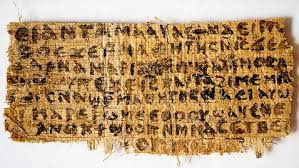Posted: April 10, 2014 | Author: bostonboomer | Filed under: Foreign Affairs, morning reads, U.S. Politics, War on Women | Tags: "Gospel of Jesus's Wife", "The 20 stages of reading", ancient papyrus, Dagestan, Dzhokhar Tsarnaev, Edward Snowden, Emir Muaz, FBI, Glenn Greenwald, Heartbleed bug, Jesselyn Radack, Lynda Barry, Mike Huckabee, Rep. William R. Keating, Russia, Sexism, Tamerlan Tsarnaev |

Good Morning!!
We’re approaching the anniversary of the Boston Marathon bombings–next Tuesday April 15–so it’s not surprising that more stories related to last year’s attacks are appearing in the media.
In a surprising and revealing story, the LA Times yesterday broke the news that shortly before last years’ marathon, alleged Marathon bomber Tamerlan Tsarnaev tried to change his first name to “Muaz” in tribute to Emir Muaz, a militant anti-Russian fighter who was killed in Dagestan in 2009. From the LA Times:
Less than three months before the Boston Marathon bombings, a bitter, frustrated Tamerlan Tsarnaev visited a federal immigration office in the Boston area and signed forms seeking to legally change his first name.
Eager to recast himself in the model of a well-known rebel figure killed by Russian forces in 2009, Tsarnaev chose as his new name “Muaz,” according to a previously undisclosed Homeland Security Department petition form, which was obtained by The Times. It was not only a tribute to Emir Muaz, a celebrated fighter in Russia’s Dagestan republic, it was also the nickname rebels had given Tsarnaev during his six-month visit to the region in 2012, law enforcement officials say.
Asked as part of the Jan. 23, 2013, application to explain his name change request, Tsarnaev described the decision in political terms, according to a federal law enforcement official close to the Boston bombing case. “He said, ‘The Russian people have been terrorizing my home country for all these years.’ This is why he needed to come back to America and help,” the official said.

Emir Abu Muaz
The name change request was an update to a citizenship application filed in 2012 that was held up by Homeland Security because of a domestic violence conviction against Tsarnaev and because officials learned that the FBI had investigated Tamerlan in 2011. The younger Tsarnaev brother, Dzhokhar had been granted citizenship at a ceremony on September 11, 2012. From the NYT, April 20 2013:
The record of the F.B.I. interview was enough to cause Homeland Security to hold up Mr. Tsarnaev’s application. He presented those papers several weeks after he returned from a six-month trip overseas, primarily to Russia, and only six days after his brother, Dzhokhar A. Tsarnaev, 19, had his own citizenship application approved. Dzhokhar Tsarnaev is in custody and is in serious condition in a hospital.
Late last year, Homeland Security officials contacted the F.B.I. to learn more about its interview with Tamerlan Tsarnaev, federal law enforcement officials said. The F.B.I. reported its conclusion that he did not present a threat.
At that point, Homeland Security officials did not move to approve the application nor did they deny it, but they left it open for “additional review.”
Lawyers for Dzhokhar Tsarnaev have argued that the FBI most likely tried to enlist Tamerlan as an informer and his resentment of the pressure they put on him may have contributed to his radicalization. The FBI claims they only met with Tamerlan one time, but his mother Zubeidat Tsarneva said last year that FBI agents “followed them for years.” Lawyers for younger brother Dzhokhar also say there were multiple contacts between Tamerlan and the FBI. From the LA Times:
…according to his brother’s lawyers, the FBI’s involvement went further. They said in court papers that there was “more than one” FBI visit to talk with Tsarnaev and his parents, that he was questioned about his Internet searches, and that the bureau “asked him to be an informant.”
“Tamerlan misinterpreted the visits and discussions with the FBI as pressure, and they amounted to a stressor that increased his paranoia and distress,” defense attorneys argued in the filings.
Federal prosecutors, however, told defense attorneys in a March 14 letter that they had “no evidence that Tamerlan Tsarnaev was solicited by the government to be an informant.” They did not comment on whether there were multiple FBI visits….
The new revelations about Tsarnaev have prompted defense lawyers for his brother to characterize him as the key player who “supplied the motivation, planning and ideology behind the Boston Marathon attack,” according to recent filings.

Tamerlan and Dzhokhar Tsarnaev
A couple more tidbits: Massachusetts Rep. William R. Keating revealed yesterday that Russian warnings about Tamerlan Tsarnaev after his trip to Russia in 2012 included a suggestion that he might try to change his name.
Keating said in an interview that Russian intelligence letters sent to both the FBI and CIA in 2011 about Tsarnaev predicted he would seek to change his name. The letter did not say what name Tsarnaev would take, according to Keating. Keating said Russian intelligence agencies read him a copy of the letter they sent to the FBI and the CIA. He took notes from the conversation, but was not given a copy of the letter.
“It’s amazing how much information they did know, the Russians,” Keating said. “Look at everything that’s there. The change of the name, that’s corroborated. That he wanted to travel back to Russia, that’s been corroborated. That he wanted to enlist with extremists, that’s corroborated. I mean, everything that was in that [warning] has been corroborated.”
However the Globe uncovered a different explanation for the desired name change:
During six months in Dagestan in 2012, Tsarnaev fell in with members of an Islamic advocacy group that believes in the establishment of an Islamic caliphate governed by sharia religious law that would span the Caucasus. They are sharply critical of US interventions in Muslim countries, but they do not openly espouse violence, and they are not outlaws.
His associates in Dagestan told the Globe that when Tsarnaev learned that he was named after a medieval Mongol warlord who conquered much of Central Asia, he wanted a new name. They said they chose the name Muaz, after an early Islamic scholar, and Tsarnaev adopted it. All of his friends in Dagestan know him as Muaz.
Finally, the NYT reported yesterday that Russia also withheld some of the information they had on Tamerlan.
Russian officials had told the F.B.I. in 2011 that the suspect, Tamerlan Tsarnaev, “was a follower of radical Islam and a strong believer” and that Mr. Tsarnaev “had changed drastically since 2010 as he prepared to leave the United States for travel to the country’s region to join unspecified underground groups.”
But after an initial investigation by the F.B.I., the Russians declined several requests for additional information about Mr. Tsarnaev, according to the report, a review of how intelligence and law enforcement agencies could have thwarted the bombing.
At the time, American law enforcement officials believed that Mr. Tsarnaev posed a far greater threat to Russia.
The new inspector general’s report found that it was only after the bombing occurred last April that the Russians shared with the F.B.I. the additional intelligence, including information from a telephone conversation the Russian authorities had intercepted between Mr. Tsarnaev and his mother in which they discussed Islamic jihad.
Phew! Lots of Boston bombing news all of a sudden. I wonder what else will come out in the run-up to this year’s Marathon, which will be held on Monday, April 21.
In other news . . .

Yesterday tech sites and Twitter were abuzz with the news of the “Heartbleed bug” a software encryption vulnerability that has the potential to give hackers access to “two-thirds of the internet’s servers” as well as to private encryption keys such as those used by Edward Snowden and Glenn Greenwald. Read all about it at Ars Technica.
In fact yesterday Cryptome.org published a supposedly private e-mail from Jesselyn Radack, who claims to be Snowden’s “legal adviser” and Glenn Greenwald. Radack had been tricked into responding to a fake Greenwald key created by an unknown hacker. The bug has been out there for two years, so tell me again how Snowden and Greenwald are so sure the stolen NSA data is safe from Russia and China?
This encryption stuff is all Greek to me, but here are a few more links to explore:
Washington Post: Heartbleed bug causes major security headache
The New Yorker: The Internet’s Telltale Heartbleed
CNet: Which sites have patched the Heartbleed bug?

Mike Huckabee is at it again. From TPM, Huckabee: Men Hunt Together, Women Go To The Restroom Together
Mike Huckabee played up gender stereotypes in a speech delivered Tuesday night in Iowa.
As she live-tweeted the former Arkansas governor’s speech at a fundraiser for Iowa’s Faith and Freedom Coalition on Tuesday in Waukee, Iowa, Des Moines Register columnist Kathee Obradovich passed along this line on Twitter,”.@GovMikeHuckabee says men like to go hunt/fish with other men. “Women like to go to the restroom with other women.”
“Yes, he really said that,” Obradovich said in an email to TPM on Wednesday, adding that she ultimately did not write a column about the event….
His joke about women going to the restroom together came after he challenged those in attendance to stand for their convictions, even if they have to do it alone.
You see, I have a concern that one of the reasons we lose battles we should win is because we wait to see whether or not the crowd is going to be with us. My question to you tonight — it’s nice to see a nice, full crowd of folks here in this wonderful Point of Grace Church — but I just wonder if you were the only one who showed up tonight, would you still be ready to take on the cause? Because the fact is we don’t like to do things by ourselves. We really don’t. Guys like to go fishing with other men. They like to go hunting with other men. Women like to go to the restroom with other women. I don’t get that. I can tell you this much: if I ever say, ‘I have to go to the restroom’ and some guy says, ‘I’ll go with you,’ he ain’t goin’ with me. That much I know.
I wonder what Huckabee will have to say about this? Papyrus Referring to Jesus’s Wife Is More Likely Ancient Than Fake, Scientists Say. The NYT reports:

A faded fragment of papyrus known as the “Gospel of Jesus’s Wife,” which caused an uproar when unveiled by a Harvard Divinity School historian in 2012, has been tested by scientists who conclude in a journal published on Thursday that the ink and papyrus are very likely ancient, and not a modern forgery.
Skepticism about the tiny scrap of papyrus has been fierce because it contained a phrase never before seen in any piece of Scripture: “Jesus said to them, ‘My wife…’ ” Too convenient for some, it also contained the words “she will be able to be my disciple,” a clause that inflamed the debate in some churches over whether women should be allowed to be priests.
The papyrus fragment has now been analyzed by professors of electrical engineering, chemistry and biology at Columbia University, Harvard University and the Massachusetts Institute of Technology, who reported that it resembles other ancient papyri from the fourth to the eighth centuries. (Scientists at the University of Arizona, who dated the fragment to centuries before the birth of Jesus, concluded that their results were unreliable.)
The Times hastens to add that
The test results do not prove that Jesus had a wife or disciples who were women, only that the fragment is more likely a snippet from an ancient manuscript than a fake, the scholars agree.
My response: There’s no proof he didn’t have a wife either, and the manuscript seems to suggest he might have.
I’ll end with this wonderful cartoon on reading over a lifetime by Lynda Barry, The 20 stages of reading. Check it out at the WaPo. I loved it and I think you will too!
Now it’s your turn. What stories are you following today? Please post your links in the comment thread.
Did you like this post? Please share it with your friends:











Recent Comments